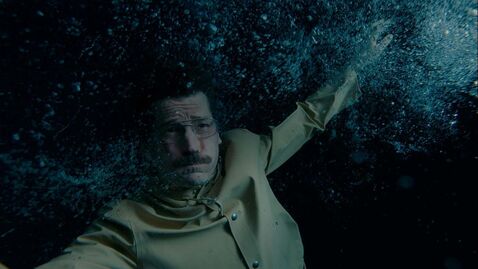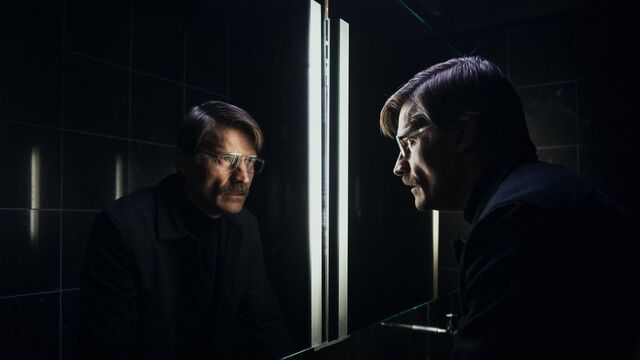 As both an only child of a single mother and, therefore unsurprisingly, a reader, my childhood can be measured and recalled in both conventional formats, ie. recall, sense memory, etc. and in writing... ...The way most of us can remember where we were when the events of September 11th, 2001 occurred, I can remember which small-town Wisconsin laundromat I was in when I saw the Time Magazine cover featuring infamous “Doctor of Death” Dr. Jack Kevorkian. In the 1990s Kevorkian was tried four times and finally convicted for providing assisted suicide services to nearly 130 terminally-ill patients between 1990 and 1998. Weighty material for a 10 year-old and no less so having entered my 30s. And still a topic of enduring personal interest. Assisted suicide is a loaded concept, socially, politically, and spiritually. It’s a difficult topic that few films broach and even fewer in any kind of meaningful way. In Exit Plan, director Jonas Alexander Arnby and writer Rasmus Birch attempt to hold it up as the cut gem that it is, exploring, in small and often anachronistic ways, its facets. Exit Plan opens with a recorded video of Max (Nikolaj Coster-Waldau of Game of Thrones) informing us that by the time we see this video he will be dead. The next moment we’re plunged into darkness with only the dim lights above hotel room doors, tiered in a shadow colosseum, to guide us. Most of what follows works in much the same fashion, pinballing us from cryptic to crystalline, shadow to light. Max and his wife Lærke (Tuva Novotny), an ethereal woman possessed of a frank charm, share a stylish home and a world of understated intimacy. He works as a claims investigator for a life insurance company and, in the process of working a claim by the presumed widow of a disappeared man, suffers a strange episode and collapses in the office. A subsequent brain scan reveals that Max has a deeply embedded tumor in his brain that is growing, the prognosis terminal. The news sends Max into a downward spiral of suicidal ideation and half-attempts, the last of which is foiled by a phone call from the aforementioned widow claiming she has evidence of her husband’s death. Evidence in the form of a strikingly familiar video recorded message stating the husband has terminated his own life with the help of a mysterious hotel called The Aurora. Naturally, Max sets out to investigate. Though it becomes less and less clear what his motivation for seeking out the services of The Aurora and its staff is. Is he the pseudo-intrepid professional working undercover? Or the terrified man staring down the barrel of his decreasingly functional mortality? Arnby and Birch do a slick and splendid job of forestalling the answer. Playing with the timeline of the narrative, moving scenes like sliding block pieces, diffusing the bigger picture just enough to allow it to coalesce later, making us feel as if it had come together while we weren’t looking. It’s a play that might not have worked were the other components not so compelling. Frustrating anachronisms are soothed by brief but poignant moments of character and atmosphere. One of the best and surprising of these littered gems comes a third of the way in when Max visits a home improvement store to purchase a length of rope and asks a fellow customer if he knows how to tie a noose. The fellow shopper obliges, demonstrating the easiest of the knots he knows while casually asking how much weight it needs to support. The moment culminates following Max’s answer and the man slowly realizes what he’s being asked. It’s a small moment, but I’m still thinking about it, even now, days later. Exit Plan pulls few punches in its exploration of the implications of such a place as The Aurora, and the varied effect it has on its clients. Everything is attended to, every conceivable aspect of the process of terminating one’s own life is considered. Unsurprisingly, everything about the proceedings is executed with cultish cool. Each meeting, meal, and meditation leading up to the final act radiate a calm mania. An effective tool I’ve seen used in the better examples of recent cult-ish horror/thrillers. The delay of gratification is further softened by the sheer amount of mood and atmosphere that have been applied to the film. From the score, to the cinematography, to the choice of color palette. There are a handful of breathtaking aerial shots, sweeping over the sloping volcanic Scandanavian tundra. Cat-like striations in titanic rock formations are highlighted by snow and a perpetual mist hangs in the air. The geological drama of The Aurora’s location was enough to make me forget all about the assisted suicide aspect and start me googling airfare. The interiors play like prehistoric IKEA, Jurassic in scale. It’s all rock and light wood cut in perfect symmetry, it’s so hip and minimal I didn’t even think twice when the sauna session included brewed opium tea best ingested with a wedge of lemon. Poppies? Oh honey, sign me up. It would be fair to say that Exit Plan never leans too far into horror, at least not until the last quarter of the film which, unfortunately, happens to also be the messiest quarter. But honestly, did we really expect to escape a psychological thriller whose central conceit was assisted suicide without a few bumps and bruises? Bless your heart if you did. Still, all in all I’d have to say we made out splendidly for a film that should, by all rights, be quite difficult to end in a satisfying way. Exit Plan is a great showcase of everything and everyone involved. The cast and their performances are impeccable and everything else has me genuinely excited to see what the filmmakers get up to next. For all the moving parts and touchy topics that could have sent this project straight to hell it turned out to be a little slice of celluloid heaven. Exit Plan becomes available in select theaters and on VOD June 12th from Screen Media. By Paul Bauer
0 Comments
Leave a Reply. |
Archives
March 2023
|


 RSS Feed
RSS Feed